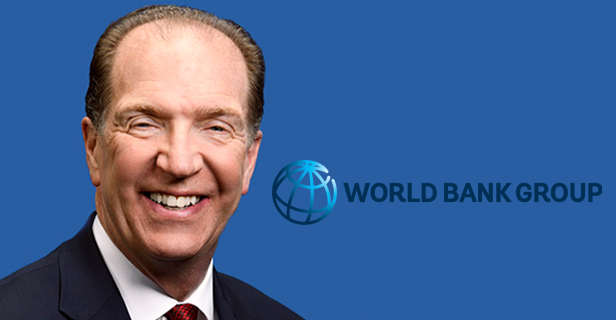January 13, 2021
World Bank Expects 3.5% U.S. GDP Growth in 2021
Global growth could hit 4%, but significant uncertainty remains amid the challenges posed by COVID-19.
The United States economy will grow at an estimated annual rate of 3.5% in 2021, while worldwide gross domestic product will expand 4% this year, according to World Bank Group.
World Bank, a Washington, D.C.-based international financial institution that provides loans and grants to the governments of low- and middle-income countries, cautioned that the short-term outlook is difficult to predict and that growth could be slowed by surging COVID-19 infections and delays in getting populations vaccinated.

David Malpass, President, World Bank Group
Released in January, World Bank’s Global Economic Prospects report estimates that U.S. GDP fell 3.6% year-over-year in 2020 compared to 2019. Last year, the global economy declined 4.3%.
In Europe, World Bank Group expects output to grow 3.6% in 2021, following a 7.4% decline in 2020. Activity in Japan, which shrank by 5.3% last year, is forecast to grow 2.5% this year.
In China, where the coronavirus outbreak was kept in check with far greater effectiveness than in advanced western economies and elsewhere, the economy grew 2% in 2020, according to World Bank. The financial institution predicts China’s GDP will grow 7.9% in 2021.
While predicted return to growth for the U.S. and global economy will be welcomed by business leaders in the promotional products industry and beyond, World Bank asserted that the recovery would “likely be subdued, unless policy makers move decisively to tame the pandemic and implement investment-enhancing reforms.”
“To overcome the impacts of the pandemic and counter the investment headwind, there needs to be a major push to improve business environments, increase labor and product market flexibility, and strengthen transparency and governance,” said World Bank Group President David Malpass. Failure by leaders to act effectively could exacerbate pre-existing economic conditions that are poised to slow global growth in the decade ahead.
The COVID-19 pandemic will likely leave lasting adverse effects on the global economy, according to the latest #WBGEP2021. A decade of disappointing growth may lie ahead without comprehensive reforms to rekindle robust, sustainable, and equitable growth. https://t.co/VSAQ28g6rA pic.twitter.com/WQ0r3CXJw4
— World Bank (@WorldBank) January 11, 2021
“The pandemic…is likely to worsen the slowdown in global growth projected over the next decade due to underinvestment, underemployment and labor force declines in many advanced economies,” World Bank said. “If history is any guide, the global economy is heading for a decade of growth disappointments unless policy makers put in place comprehensive reforms to improve the fundamental drivers of equitable and sustainable economic growth.”
As one step, World Bank advised policymakers to sustain the recovery by gradually shifting from income support to growth-enhancing policies.
“In the context of weak fiscal positions and elevated debt, institutional reforms to spur organic growth are particularly important,” the bank said. “In the past, the growth dividends from reform efforts were recognized by investors in upgrades to their long-term growth expectations and increased investment flows.”
An incipient global economy recovery has moderated due to a resurgence of COVID-19 cases. Top near-term policy priorities are containing the virus and ensuring rapid and widespread vaccine deployment. https://t.co/pGH4mSQvnr #WBGEP2021 pic.twitter.com/dxo6FWadOl
— World Bank (@WorldBank) January 12, 2021
In a separate prediction, the chief economist for the International Monetary Fund (IMF), Gita Gopinath, recently predicted that most developed countries should begin to return to normal by the second half of the year as COVID vaccinations accelerate. Despite surging coronavirus cases, hospitalizations and death in the U.S. and Europe, as well as a sluggish vaccine rollout in the U.S., Gopinath expects most developed countries to have large swaths of their populations vaccinated by the summer, which should bode well for economies.
“It’s a very dark and difficult winter, but there’s light at the end of the tunnel,” Gita Gopinath told CNBC. “In terms of the outlook, what’s true as of now is that we’re starting out the year at a somewhat stronger point than we had expected, which is a good thing. But right now, it’s a race between the virus and the vaccine.”
IMF, a Washington, D.C.-based international organization that works to foster global monetary cooperation and secure financial stability, predicted in an October forecast that global growth would be 5.2% in 2020. IMF estimated U.S. growth would be 3.1% this year. An updated IMF forecast is due out on January 26.
